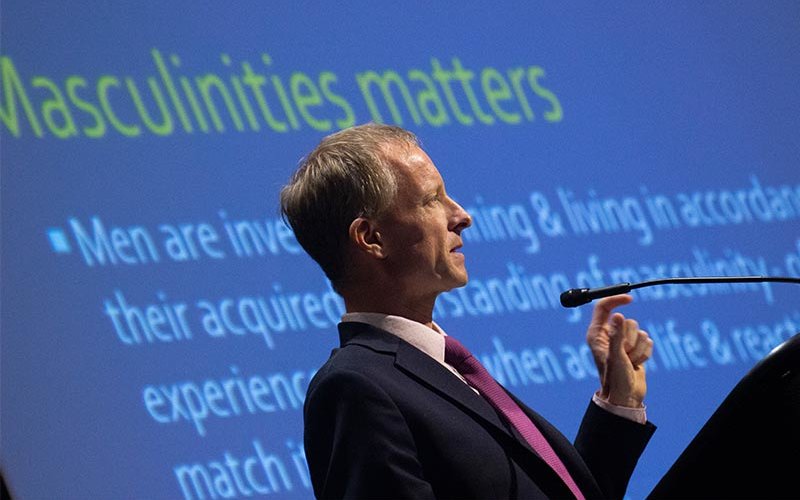
The key to healthy masculinity is to understand the role of adaptability and responsiveness, explained Matt Englar-Carlson during the Oct. 8 Outstanding Professor lecture, “What Does It Mean to Be a Healthy Man? Exploring Ideas of Positive Masculinities.”
Before a full audience of students, faculty and staff, the 2019 Outstanding Professor Award recipient and professor of counseling would take the audience through a journey in search of how men and society see masculinity and how traditional gender constructs can hamper men in understanding themselves and responding to circumstance.
Masculinity, he began, “is one of these topics everyone has an opinion on .…“
So, how do we learn what it means to be masculine? Englar-Carlson led with a question: “What does it mean to be a good man?”
“Think about that for a while,” he encouraged before sharing what answers he has received in more than 20 years of research and listening to men. “It’s integrity, honor, responsibility, good provider, doing the right thing, putting others first …”
When he asked men how they learned that, they couldn’t come up with a specific situation or person who had said it: “it seems to be innate, in the air we breathe.
“So, what does it mean to be a real man?” he followed, reading a list of traits that included powerful, aggressive, never cry, be strong, play through the pain, suck it up.
And where does this come from? The answer is usually from a father or other male figure, he explained.
The examples for a good man are really that of a good person, which takes gender out of the equation, said Englar-Carlson. But the examples of a real man, makes it one of the most gendered of terms.
“So, consider this: There are times in every man’s life when he has to betray values, ethics and the idea of what it takes to be a good man in order to prove himself a ‘real man.’ And every man in the audience can respond to that.”
Yet Englar-Carlson presented the idea that being a good man and real man can also be the same.
“Masculinity is important to men,” Englar-Carlson noted, explaining that research has found most men in the middle range on what is masculine identity. Equally, research also shows men think they aren’t as masculine as they should be. “So they tend to try to prove it again, and again, and again.”
It’s when the attributes seen as masculine become rigid that they can become harmful,” Englar-Carlson stressed, noting statistics that show men die from suicide more than women at a ratio of roughly 4 to 1, men tend to die almost five years earlier than women, and 93 percent of those incarcerated are men. And the unfortunate aspect is that “those who most need help won’t seek it.
“There’s a need to stand up, a need to talk about the challenge between being a good man and a real man,” stressed Englar-Carlson. “It’s false that there is only one way to be a man.”
So, what is positive masculinity? The attributes include responsibility, courage, altruism, resilience, service, calm in the face of danger, being protective of others and perseverance.
“Healthy masculinity is real,” said the scholar. “And it can be a powerful tool to help boys and men. You need to actively think about what masculinity means to you and the men in your life.”